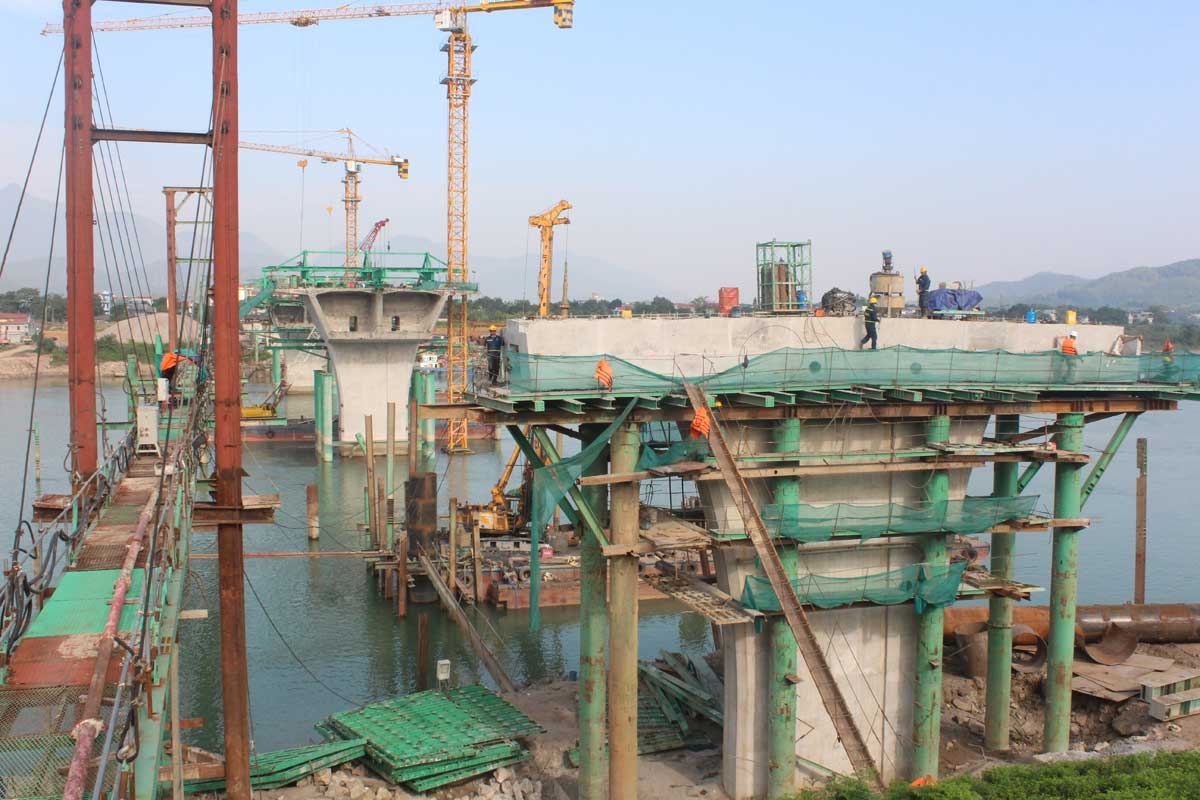
(HBO) - Hoa Binh 2 bridge project was approved by the Hoa Binh provincial People’s Committee under Decision No.2536/QD-UBND dated October 30, 2018, costing 590.81 billion VND from local budget and other legitimate sources.
As a key transport work, it is expected to contribute to improving
transportation infrastructure, become an architectural landmark and promote
investment to expand urban space in Hoa Binh city.
 The Hoa Binh 2 bridge (Hoa Binh city) is under
construction.
The Hoa Binh 2 bridge (Hoa Binh city) is under
construction.
To speed up the project’s progress and a road linking
National Highway 6 with Chi Lang road, the provincial Party Committee’s
Standing Board issued Conclusion No.303 on April 15 on prioritising capital for
projects.
Compensation and site clearance were carried out in
September 2019 on a total area of nearly 42,600 sq.m, including 26,490.1 sq.m
in Thinh Lang ward and 16,109.8 sq.m in Dong Tien ward. Up to 79 households and
organisations are subject to site clearance, including 13 households and two
organisations in Thinh Lang ward, 62 households and two organisations in Dong
Tien ward. The resettlement is expected to be arranged for 26 households,
including three in Thinh Lang ward and 23 others in Dong Tien ward.
Bored piles have been built for seven out of eight pillars
and half of the abutments. Six out of eight pillars have been completed. As
many as 17 out of 21 plate girder slabs were produced. K0 blocks were built on
pillars T3 and T4. The total volume of construction and assembling surpassed
179.8 billion VND, or 42.75 percent.
At present, the abutment M1 and bridgehead road could not be
built due to unfinished site clearance. In the near future, the contractor will
focus on building pillar T2.
Last year, 150 billion VND were earmarked for the Hoa Binh 2
bridge. The figure this year was 150 billion VND. All of them have been
disbursed. As planned, final segments of the bridge will be connected later
this year./.
Hoa Binh province is undergoing a dynamic transformation amid Vietnam’s national digital transition. Building on Poliburo’s Resolution No. 57-NQ/TW on breakthroughs in science, technology, innovation, and national digital transformation, the province has rolled out a wide range of practical action plans. A standout initiative is the "Digital Literacy for All” movement, an effort to ensure that no one is left behind in the digital era.
Hoa Binh province is undergoing a dynamic transformation in the wake of the national digital transformation movement. Building on Resolution No. 57-NQ/TW of the Politburo on breakthroughs in science, technology, innovation, and national digital transformation, the province has implemented a wide range of practical action plans. A standout initiative is the "Digital Literacy for All” movement ambitious effort to ensure that no one is left behind in the digital age.
With a spirit of unity and proactive problem-solving, the Party Committee, the government and the people of Dong Lai Commune (Tan Lac District) have made great strides in implementing the resolutions of the 24th Party Congress of the commune for the 2020 - 2025 term. Focusing on leadership and practical actions, the commune has brought the Party’s resolutions into daily life, creating strong impacts and pushing the local development forward.
Amid the nationwide push for digital transformation, young people in Hoa Binh Province are stepping up as dynamic pioneers, applying technology to enhance Youth Union operations and expand the reach of youth-led initiatives. Through creativity and adaptability, Youth Union organizations at all levels have introduced a series of practical solutions, contributing to modern governance and community development.
In recent years, An Nghia commune, located in Lac Son district, has stepped up administrative reform, focusing on improving the quality and efficiency of its single-window service unit for receiving and processing administrative procedures. These improvements have helped create favourable conditions for local residents and organisations to handle administrative procedures, contributing to the commune’s broader socio-economic development.
The Prime Minister-approved master plan to develop the multi-use value of forests ecosystems through 2030, with a vision to 2050, aims to improve the management and sustainable use of forest resources, create jobs, increase incomes, and improve the living standards of ethnic minorities, people in mountainous and remote areas, forest workers and those living near forests.



 The Hoa Binh 2 bridge (Hoa Binh city) is under
construction.
The Hoa Binh 2 bridge (Hoa Binh city) is under
construction.